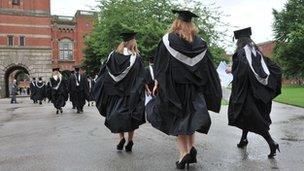Record fall in university places taken up, says Ucas
- Published

There has been a record fall in the number of people taking up places at UK universities this year, figures show.
Nearly 54,000 fewer people started courses this autumn than did so last year, the admissions body Ucas says.
Ucas says some of this is explained by demographics and changing behaviour on gap years.
England, where maximum fees have almost trebled to £9,000 a year, saw the sharpest drop in people taking places in 2012, with a 6.6% fall.
The Ucas figures show the fullest picture yet of students who were the first to apply to study in the UK under new tuition fee policies.
Numbers of people from Wales who accepted places around the UK rose 5%, while those from Northern Ireland fell 3.7% and those from Scotland were slightly up (0.3%).
More Welsh students came to England to study, while fewer English students headed to Wales.
Gender gap
The statistics also suggest an underlying trend of increasing applications from poorer teenagers has continued and that more disadvantaged 18-year-olds are getting places in the most academically-selective universities.
Another key finding was that the gap between girls and boys applying and getting in to university is widening.
Girls are more likely to apply to university than boys and more likely to get places at the most selective institutions.
Ucas statisticians said part of the overall fall in numbers taking up places could be explained by the fact that there is a demographic dip in 18-year-olds in England and partly by the fact that numbers starting university in 2011 (the last year before higher fees came in) were boosted by some who might have otherwise taken a gap year.
Numbers taking gap years shrank in 2011 as thousands of teenagers in England opted instead to avoid the higher fees, which came in this September, and go straight to university from school and college.
This year, Ucas say more people are taking gap years again, making the drop in numbers starting university this term even sharper.
Ucas chief executive Mary Curnock Cook said: "The headline numbers in this report signal the challenging environment for recruitment in 2012 for some parts of the UK higher education.
"However, the underlying findings are more subtle. For example, although demand for higher education has fallen in England, the actual entry rates for young people are close to trend.
"The continuing increase in participation from more disadvantaged groups is very encouraging."
Universities Minister David Willetts said he expected the total number of full-time students in higher education this year would be bigger than in any year before 2010.
"Therefore this shows the benefits of our reforms coming through already," he said.
"More students are going to their first choice institution. Moreover, acceptance rates for applicants from disadvantaged areas increased this year. Our reforms are helping students to make well-informed choices using better information."
Shabana Mahmood, Labour's Shadow Higher Education Minister, said the government's tuition fees policy had "put a brake on aspiration" and led some people to decide against university at a time when high level skills were more important than ever.
Academics in the University and College Union (UCU), said fewer students at universities meant the government's higher education policies were failing.
The union's general secretary Sally Hunt said: "Higher tuition fees forced a scramble for places last year, which simply highlights the unfair nature of the government's hike in fees.
"If we are to open up university to our most talented people we need to remove punitive financial barriers."
The latest UK university application figures for entry next year show an 8% fall compared with the same point last year - and are the lowest for at least six years.
- Published28 November 2012
- Published4 January 2012
- Published20 August 2012
- Published9 August 2012